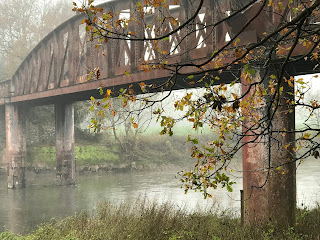Have you ever bought something, and then realised too late it was a mistake—and the worst kind of mistake? In this case, the mistake was on the part of the supplier but compounded by our failure to do anything about it until almost too late.
We are both admirers of Vincent Van Gogh; I’ve met few people who aren’t. And after a visit to the Van Gogh museum in Amsterdam, I bought my wife a canvas of a painting seen in Tate Britain and one she particularly admired.
This is what it should have been.
This is what we got.
And our mistake was in the fruitless months we spent in deluding ourselves (well, attempting to) that it was perhaps the light—if we squinted—if we turned widdershins three times with eyes closed and then opened them—everything would be alright. But, curtains closed, lights on, curtains open and sun pouring in—the result was the same muddy teal effect instead of the glorious blue.
I didn’t have to sense my wife’s disappointment. She told me tactfully so, with little hope of success, I wrote to Tate Britain:
Hi,
This, I'm afraid is a delayed complaint. I bought from you a print of Vincent van Gogh's Starry Starry Night as a Christmas present for my wife last year. It’s been almost a year now that we've tried to convince ourselves that our eyes are just playing tricks and that we are the proud owners of a replica picture we saw at the exhibition and on display in your shop.
I have no idea who is at fault here, other than ourselves for not complaining at once, but as I said, we foolishly tried to convince ourselves that everything was fine when clearly it was not.
I'd appreciate very much your opinion of the two pictures attached, the one we expected and the one we received. It certainly colours the possibility of any other purchases (and there is one in mind) as well as recommending such purchases to others.
Hoping you are well in these difficult times
Mike Keyton
You could have knocked me down with half a feather when I got this response.
Hello Michael,
Thank you for getting in touch and for your ongoing patience. I can only apologise for the delayed response, we have been working with a higher demand on a reduced team but I can assure you that we are getting on top of things now.
I am sorry to see that you’re dissatisfied with your print; I just wanted to assure you that I have passed your feedback onto our Print Production Manager and they will investigate the image file used for this print. We always try to match the piece to the artwork as well as we can but obviously, it can be difficult to accurately reflect the nuances of oil paintings in a print format.
I do agree that this print is far from ideal, though and therefore, if you would like to receive one, I would like to offer you a replacement print of another artwork. If this is acceptable, please do let me know your preferences, as well as confirming your address and I can raise the order for you.
I can assure you that we will investigate the issues with the Starry Night piece but it can take quite some time for us to process a new image if possible.
Please do let me know if there is anything else that I can help you with,
Hi,
That is really kind of you and it’s very much appreciated. In an ideal world, we’d be happy with a better replacement for the same £75 canvas print. It’s my wife’s favourite painting by Van Gogh. But if that is impossible we’d be very happy with a canvas print to the same value of Vincent Van Gogh Farms near Auvers. Please could you confirm if this is possible?
Thank you again,
Mike Keyton
Hello Michael,
Thank you for getting back to me.
Yes, I am happy to raise a complimentary order for any custom print that you would like, not limited to canvas prints but also any framed prints if you would prefer.
I am sorry that we aren’t able to offer another order of your wife’s favourite painting at the moment but the process of reassessing and processing a print file can take a number of months to complete, and we have a reduced workforce at the moment, so I wouldn’t be able to predict how long this will take.
Let me know if you would like to proceed with the Farms near Auvers canvas print.
Additionally, I would also be happy to offer you a pair of Starry Night over the Rhône espresso mugs as this is the other product we have with this artwork, as a small gift and gesture of goodwill to yourself and your wife.
So now we are the proud possessors of:
as well as two small bone china cups.
The last blog post of 2020. Fingers crossed for 2021
PS The weird white background is due, I suspect, to copying and pasting from email (names and details retracted) Sorry about that.










































